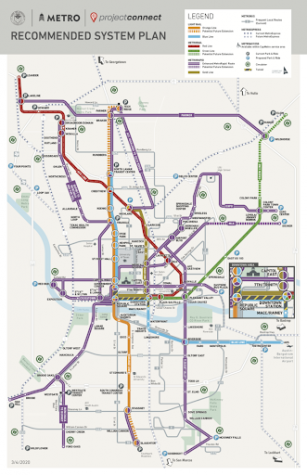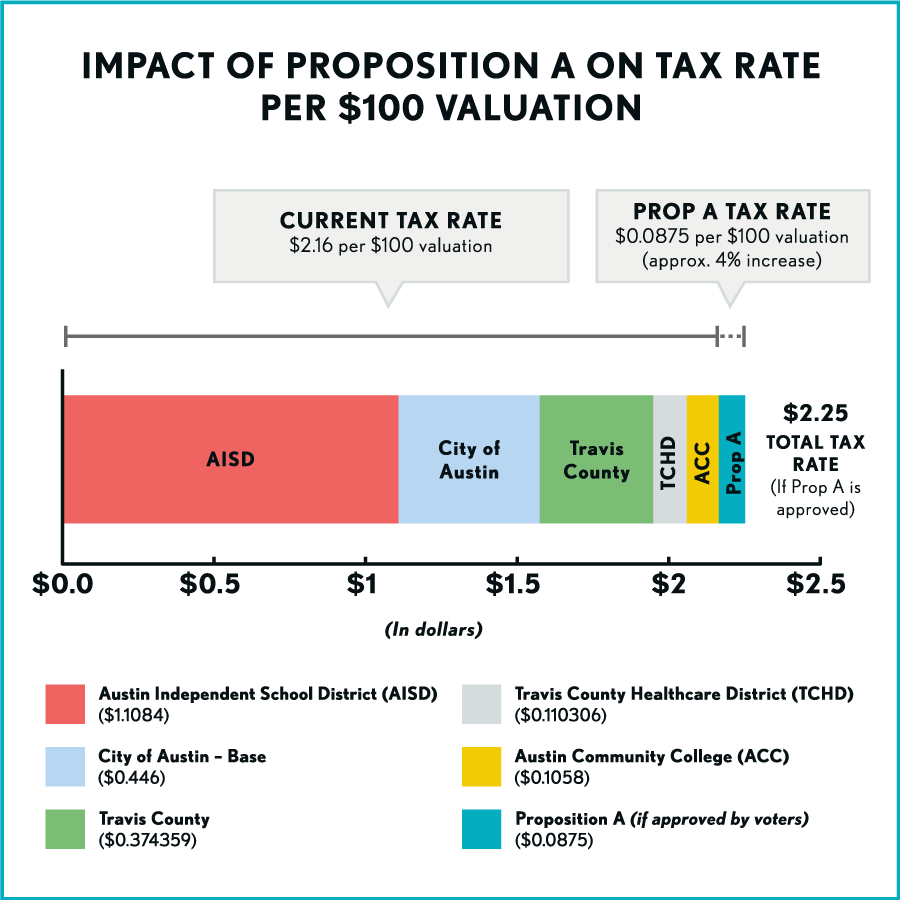New, popular propositions cause divide in voter opinions
Many opponents of Proposition A argue that the government should not raise taxes during a pandemic.
If you’ve lived in Texas long enough, you may have experienced the monstrosity that is I-35. Whether you are driving through Waco or even downtown Dallas, there’s the possibility of being stuck in stop-and-go traffic for a fraction of your drive. After moving to Austin, I began to drive on I-35 more often to get to where I need to go. Most of the time, I sit in bumper-to-bumper traffic from the second I get on the highway to the second I get off. One of the most influential yet controversial propositions in Austin today is Prop A, which discusses funding toward Project Connect.
Project Connect is a transportation plan for Austin that involves expanding public transit efforts. It’s basically an intricate rail system that would include a new rail line serving North and South Austin, the airport, downtown and Colony Park, a transit tunnel built underground to separate rails from traffic and improve on-time performance, expanded bus services and even nine new Park & Ride locations. When examined from afar, it doesn’t seem like such a bad investment. But there are several people who say the proposition will do more harm than good.
If approved by voters, the city of Austin would experience what opposers are calling a “tax hike”. According to Our Mobility Our Future’s website, “taxes would increase on the average-priced property over $2,800/year to fund and operate.” The total tax rate would rise to $2.25 per $100 valuation, which is an 8.75 cent (4%) increase. Those extra 8.75 cents would be dedicated to the project to ensure completion, and the property tax revenue would provide funding for the capital costs plus operating expenses and maintenance costs of the system once fully built. As well as our tax money getting put toward the new project, taxes would also be helping a new organization called the Austin Transit Partnership get funded, which would overlook the finances and implementations of Project Connect.

When taking a look at the new system, it’s visible that several lines would cover 27 miles of service and include 31 stations. As for buses, there would be four new Rapid Bus routes, connecting a good amount of Austin Community College campuses, the Expo center, and even Burnet road to downtown and beyond. As for Park & Ride facilities, the nine new locations would be at places like Four Points and Loop 360. Overall, another goal placed by Project Connect is to reduce carbon emissions in our city by reducing traffic. So if you’re like me, someone who knows very well how crowded roads like I-35 can get for long periods of time, this may sound appealing.
Another large dispute with this current proposition is the campaigning. Many are wondering who is behind the scenes funding these advocating political campaigns. Some state they notice their advertising isn’t showing the “ugly truth” behind the project, such as the tax hikes that would occur during an ongoing pandemic. Opposers have even gone as far as promoting their own campaign that advocates against the current proposition. I’ve seen several signs throughout the South Austin area that read “No tax hikes during a pandemic.” Because the funding for this project’s campaign is so cloudy, citizens are skeptical.
Now looking back on a benefit that could rebuttal these conspiracies, it’s clear that those who travel to and from downtown may support this change. As more and more workers prepare to go back into the office after spending most of their time working from home, congestion may get even worse. Those who are looking for a faster alternative and have the ability to travel to work should attempt to use the new rail lines and/or metro systems. I personally know a family friend who used to take the train to work everyday before the pandemic. Her son would drop her off at the station every morning so he could have the ability to use the family car for school. She’s done this for nearly two years. It’s people like that who may end up voting for Prop A to ensure easier city access and reliable transportation.
As for me, I wouldn’t see an issue with having a quicker alternative to getting from point A to point B. That being said, I realize how this proposition may negatively affect not just me, but also my friends and family members. What about those who will never use the new transports? They are essentially putting their tax money toward something that doesn’t even benefit them. Like myself, I’ve never once set foot on public transportation, both bus or train, in Austin before, so what would this proposition do for me? Perhaps the congestion on the popular roadways will decrease, causing my trips back home to shed a few minutes, but is that all?
Overall, Prop A seems like something that would be beneficial for those who may not be able to afford vehicles of their own, or even college students who need quick transportation to campuses across the city. Personally, I don’t like deciding whether or not something is good or bad for our city until the idea is actually acted upon, so it may be awhile before we are able to step back and fully analyze the effects it’s had on us and Austin. Vote for what you will, but remember that what is being advertised to you may be misleading, and it’s always good to conduct research of your own before making a decision that could impact others lives more than yours.

Claire is a senior Communication major with a minor in Journalism continuing to dedicate her time growing and learning as a student journalist. Claire...







